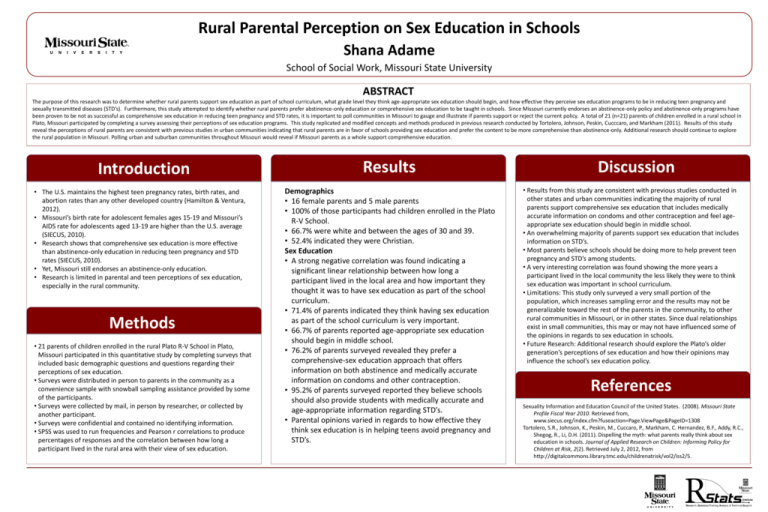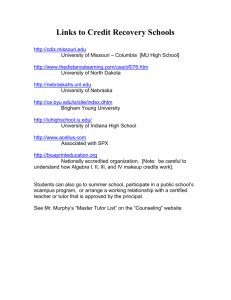
Rural Parental Perception on Sex Education in Schools
Shana Adame
School of Social Work, Missouri State University
ABSTRACT
The purpose of this research was to determine whether rural parents support sex education as part of school curriculum, what grade level they think age-appropriate sex education should begin, and how effective they perceive sex education programs to be in reducing teen pregnancy and
sexually transmitted diseases (STD’s). Furthermore, this study attempted to identify whether rural parents prefer abstinence-only education or comprehensive sex education to be taught in schools. Since Missouri currently endorses an abstinence-only policy and abstinence-only programs have
been proven to be not as successful as comprehensive sex education in reducing teen pregnancy and STD rates, it is important to poll communities in Missouri to gauge and illustrate if parents support or reject the current policy. A total of 21 (n=21) parents of children enrolled in a rural school in
Plato, Missouri participated by completing a survey assessing their perceptions of sex education programs. This study replicated and modified concepts and methods produced in previous research conducted by Tortolero, Johnson, Peskin, Cucccaro, and Markham (2011). Results of this study
reveal the perceptions of rural parents are consistent with previous studies in urban communities indicating that rural parents are in favor of schools providing sex education and prefer the content to be more comprehensive than abstinence-only. Additional research should continue to explore
the rural population in Missouri. Polling urban and suburban communities throughout Missouri would reveal if Missouri parents as a whole support comprehensive education.
Introduction
• The U.S. maintains the highest teen pregnancy rates, birth rates, and
abortion rates than any other developed country (Hamilton & Ventura,
2012).
• Missouri’s birth rate for adolescent females ages 15-19 and Missouri’s
AIDS rate for adolescents aged 13-19 are higher than the U.S. average
(SIECUS, 2010).
• Research shows that comprehensive sex education is more effective
than abstinence-only education in reducing teen pregnancy and STD
rates (SIECUS, 2010).
• Yet, Missouri still endorses an abstinence-only education.
• Research is limited in parental and teen perceptions of sex education,
especially in the rural community.
Methods
• 21 parents of children enrolled in the rural Plato R-V School in Plato,
Missouri participated in this quantitative study by completing surveys that
included basic demographic questions and questions regarding their
perceptions of sex education.
• Surveys were distributed in person to parents in the community as a
convenience sample with snowball sampling assistance provided by some
of the participants.
• Surveys were collected by mail, in person by researcher, or collected by
another participant.
• Surveys were confidential and contained no identifying information.
• SPSS was used to run frequencies and Pearson r correlations to produce
percentages of responses and the correlation between how long a
participant lived in the rural area with their view of sex education.
Results
Demographics
• 16 female parents and 5 male parents
• 100% of those participants had children enrolled in the Plato
R-V School.
• 66.7% were white and between the ages of 30 and 39.
• 52.4% indicated they were Christian.
Sex Education
• A strong negative correlation was found indicating a
significant linear relationship between how long a
participant lived in the local area and how important they
thought it was to have sex education as part of the school
curriculum.
• 71.4% of parents indicated they think having sex education
as part of the school curriculum is very important.
• 66.7% of parents reported age-appropriate sex education
should begin in middle school.
• 76.2% of parents surveyed revealed they prefer a
comprehensive-sex education approach that offers
information on both abstinence and medically accurate
information on condoms and other contraception.
• 95.2% of parents surveyed reported they believe schools
should also provide students with medically accurate and
age-appropriate information regarding STD’s.
• Parental opinions varied in regards to how effective they
think sex education is in helping teens avoid pregnancy and
STD’s.
Discussion
• Results from this study are consistent with previous studies conducted in
other states and urban communities indicating the majority of rural
parents support comprehensive sex education that includes medically
accurate information on condoms and other contraception and feel ageappropriate sex education should begin in middle school.
• An overwhelming majority of parents support sex education that includes
information on STD’s.
• Most parents believe schools should be doing more to help prevent teen
pregnancy and STD’s among students.
• A very interesting correlation was found showing the more years a
participant lived in the local community the less likely they were to think
sex education was important in school curriculum.
• Limitations: This study only surveyed a very small portion of the
population, which increases sampling error and the results may not be
generalizable toward the rest of the parents in the community, to other
rural communities in Missouri, or in other states. Since dual relationships
exist in small communities, this may or may not have influenced some of
the opinions in regards to sex education in schools.
• Future Research: Additional research should explore the Plato’s older
generation’s perceptions of sex education and how their opinions may
influence the school’s sex education policy.
References
Sexuality Information and Education Council of the United States. (2008). Missouri State
Profile Fiscal Year 2010. Retrieved from,
www.siecus.org/index.cfm?fuseaction=Page.ViewPage&PageID=1308
Tortolero, S.R., Johnson, K., Peskin, M., Cuccaro, P., Markham, C. Hernandez, B.F., Addy, R.C.,
Shegog, R., Li, D.H. (2011). Dispelling the myth: what parents really think about sex
education in schools. Journal of Applied Research on Children: Informing Policy for
Children at Risk, 2(2). Retrieved July 2, 2012, from
http://digitalcommons.library.tmc.edu/childrenatrisk/vol2/iss2/5.







